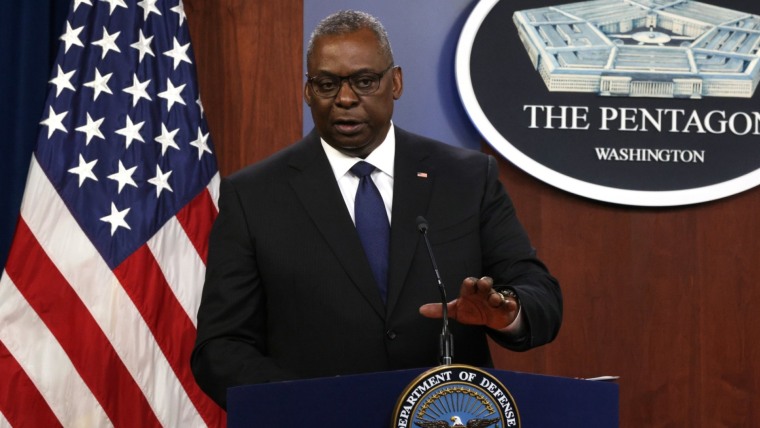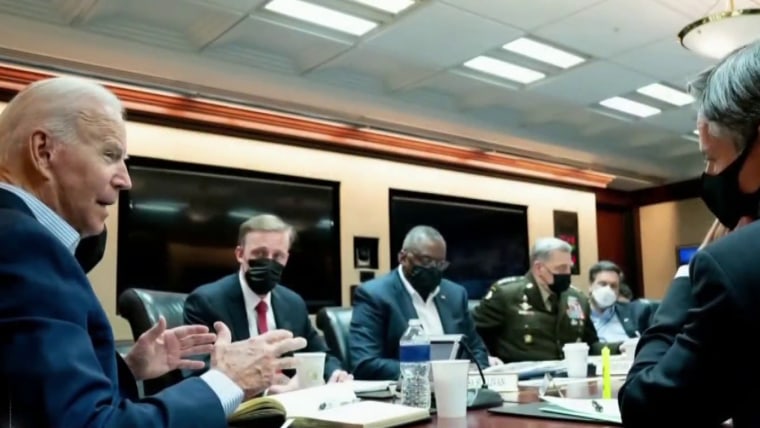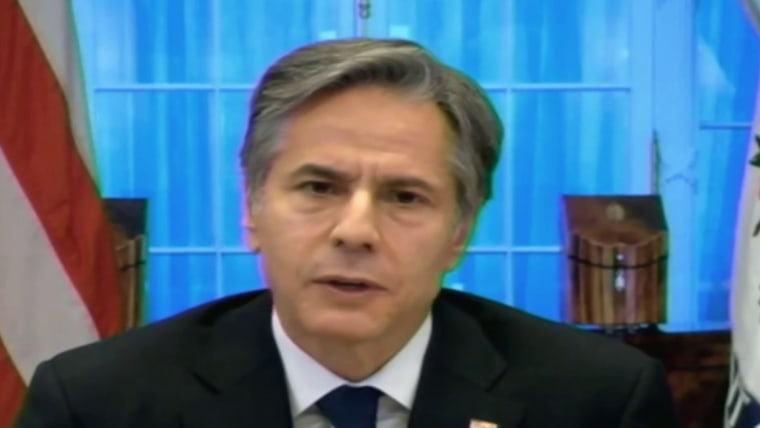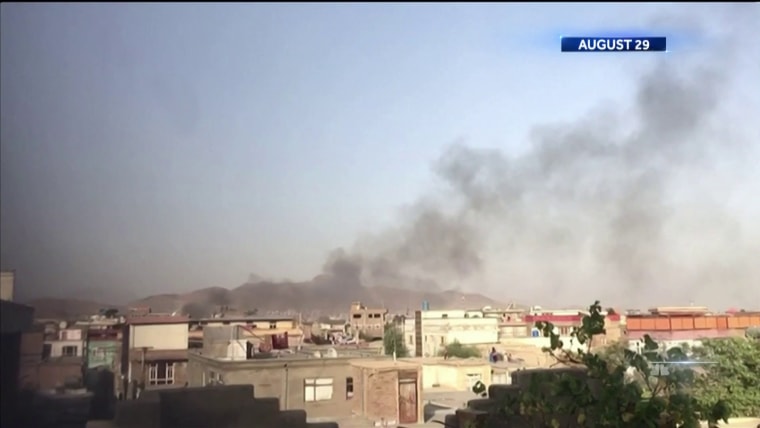WASHINGTON — In the final days of the U.S. troop withdrawal from Afghanistan, a top American general met Taliban leaders in Qatar and warned them to keep their forces out of Kabul for a few more days or else face the threat of U.S. airstrikes.
Gen. Frank McKenzie, the head of U.S. Central Command, sat across from Taliban leader Abdul Ghani Baradar and showed him a map with a circle around Kabul, about 20 to 30 kilometers (12.4 to 18.6 miles) outside the city.
McKenzie told Ghani that Taliban fighters had to stay outside the circle or the United States would strike them. McKenzie explained the U.S. would finish its withdrawal as soon as possible and the Taliban must not interfere, three senior defense officials told NBC News.
The Taliban representatives agreed not to interfere, but pointed out they already had fighters inside the circle in some places, and those fighters would not leave.
McKenzie explained his mission was the safe withdrawal of Americans and allies. The Taliban leaders agreed to let Americans leave and offered to provide a liaison for security around the airport.
The next day, Taliban fighters rolled into Kabul, and no U.S. warplanes bombed the insurgents, the three senior defense officials said.
The episode illustrates the confusion and danger that marked the end of the U.S. military presence in Afghanistan, with Biden administration officials and U.S. commanders struggling to cope with the speed of the Afghan government's collapse. Before events spun out of control, however, White House and State Department officials were not interested in hearing the military's plan for a possible evacuation of vulnerable Afghan allies, according to the three senior defense officials.
How the administration and the U.S. military managed the withdrawal will be the focus of a high-stakes congressional hearing Tuesday, when Defense Secretary Lloyd Austin, chairman of the Joint Chiefs of Staff Gen. Mark Milley, and McKenzie will appear before the Senate Armed Services Committee for the first time since America's exit from Afghanistan.
Lawmakers on both sides of the aisle have blasted the Biden administration over the chaotic withdrawal and vowed a full accounting.
Senators at Tuesday’s hearing are expected to grill the military leaders on intelligence reporting in advance of the U.S. withdrawal, recommendations to the president about troop levels before his decision to pull forces out, why Bagram Airfield was closed in July before an evacuation began, what went wrong in the Aug. 29 U.S. drone strike that killed an aid worker wrongly identified as linked to the Islamic State militant group, and nine others, including seven children, and how the Pentagon plans to carry out counterterrorism strikes if needed now that U.S. troops are out.
Austin is expected to present a timeline of events in his testimony and to try to explain the move to close Bagram as necessary given the mission and the number of troops that would have been required to secure the site, and that U.S. officials had assumed Afghan security forces would control Bagram once American forces withdrew.
But Austin and the top military officers appearing with him likely will be reluctant to discuss intelligence at a public hearing or to share the advice they gave the president on troop levels or other issues.
Lawmakers are also focused on why an evacuation of American citizens and Afghan allies was not launched much earlier and what role the military, the State Department and other agencies played in contingency planning.
The senior defense officials said that after President Joe Biden announced his decision in April to withdraw U.S. troops from Afghanistan by Sept. 11, the U.S. military was ready within weeks to present a plan for a possible large-scale evacuation of Afghans and others from Kabul. But White House and State Department officials declined the offer and asked that the topic be taken off the agenda for a meeting May 8, the senior defense officials said.
The U.S. military made it clear it was ready to carry out an airlift if ordered and if it was provided a list of names, but White House and State Department officials believed talk of an evacuation would undermine confidence in the Afghan government and possibly set off a panicked exodus, the senior defense officials said.
"They thought an evacuation would destabilize [President Ashraf Ghani's] government, but it was already unstable," one of the senior defense officials said.
The internal discussion illustrates the reluctance of senior White House and State Department officials at that time to prepare for a potential worst-case scenario, as they believed the Afghan government would remain in power after U.S. troops left in August and that a mass evacuation would not be necessary, according to the senior defense officials, congressional aides and refugee advocates who were briefed by the administration.
At the time of the May meeting, Taliban forces were engaged in a countrywide offensive and were already capturing key territory in the west and outside Kabul, the nation's capital. U.S.-funded private contractors, meanwhile, were flying out of the country as part of the American troop withdrawal. The Afghan military needed the contractors to keep its air force flying.
A bipartisan group of lawmakers who approached the White House in April about an evacuation of Afghans came away discouraged, and concluded they would have to wage a public pressure campaign to prod the administration into action, congressional staffers said.
A State Department official and a person familiar with the matter said a potential evacuation of Afghans at risk was discussed at other interagency meetings held around the same time as the May 8 discussion. They said the fact that the topic was removed from the agenda for the May 8 meeting was not significant as the subject was addressed in other meetings and in contingency planning.
Jake Sullivan, the president's national security adviser, said Aug. 17 that “the Afghan government and its supporters, including many of the people now seeking to leave, made a passionate case that we should not conduct a mass evacuation lest we trigger a loss of confidence in the government.”
He added: “Now, our signaling support for the government obviously did not save the government, but this was a considered judgment.”
Administration officials have said that the president ensured additional forces were deployed in the region in case the situation deteriorated, and those troops were at the ready and sent in August.
But in the spring, contingency planning “was all predicated on the belief that we had 18-24 months, and that’s what the intelligence suggested at the time,” a senior administration official said.
With several committees planning to conduct oversight inquiries into the U.S. withdrawal, lawmakers also are interested in the chain of events in the final days of the withdrawal that saw Ghani abruptly flee the country, Taliban forces enter Kabul and an Islamic State Khorasan group attack that killed 13 U.S. service members and dozens of Afghans.
In the first week of August, with the Afghan military on the retreat in every corner of the country, the top U.S. military officer, Milley, asked McKenzie, head of U.S. forces in Afghanistan and the Middle East, to write up a commander's assessment about the situation in Afghanistan, the three senior defense officials said.
On Aug. 8, McKenzie delivered his findings to Milley, who in turn shared them with Austin. McKenzie warned that Kabul would be encircled in 30-60 days and that the city and the whole country could fall within weeks or a couple of months at most.
The general's assessment included information from the CIA, the Defense Intelligence Agency and Central Command.
One week later, Kabul fell.
Before the Afghan capital fell, McKenzie, along with U.S. special envoy Zalmay Khalilzad, met with Taliban leaders in Doha to try to buy more time to allow the Americans time to complete a massive evacuation of Afghan allies. McKenzie drew his circle around Kabul, but Taliban fighters took over the city the next day. They would soon begin an uneasy partnership with U.S. troops in their evacuation efforts, manning checkpoints and escorting vehicles.
At recent hearings before the Senate and House Foreign Relations committees, Secretary of State Antony Blinken faced hours of tough questioning but defended the administration's handling of the withdrawal and evacuation, saying that no one had forecast the Afghan government would collapse before U.S. troops left.
Some members of Congress have offered a different interpretation of intelligence reporting in the run-up to the U.S. departure, saying grim assessments made it clear the Afghan government's situation was precarious.
The ranking Republican on the House Foreign Affairs Committee, Rep. Michael McCaul of Texas, is demanding the administration share intelligence assessments and diplomatic cables in the run-up to the troop exit, arguing the information should be declassified and shared with the public.
"All the classified intelligence that I was briefed on, I would like to see that declassified so that the American people will know what the truth is," he said. "Those documents will speak for themselves, those briefings will speak for themselves, as to what was in front of the president."
Although Republicans in Congress want oversight efforts to focus exclusively on the Biden administration's management of the U.S. exit, Democratic lawmakers also want to examine the U.S.-Taliban agreement negotiated by the Trump administration.
Under the deal, the United States promised to pull out all troops and contractors by May 1, 2021, in return for the Taliban promising to enter into peace talks with the Afghan government and not to allow Al Qaeda or other extremists to stage terrorist attacks from Afghan soil. Khalilzad, who negotiated the deal as President Donald Trump pushed for a troop pullout, called it a "peace agreement." But critics have called it a "surrender agreement" that asked little of the Taliban and shut out the Afghan government.
Before Biden made his decision in April to withdraw all U.S. troops by Sept. 11, senior military leaders, including the defense secretary, recommended keeping forces in the country to prevent the Afghan government's collapse and a potential resurgence of Al Qaeda or other terrorist groups, the three senior defense officials said.
At White House National Security Council meetings in March, Austin recommended increasing the troop presence to about 3,000 to 4,000 from roughly 2,500, the senior defense officials said. Austin argued that the slightly larger footprint would help protect the force from possible attack by the Taliban after May 1, the original promised date for a U.S. withdrawal. He also maintained that more American troops on the ground would provide Washington with more leverage in talks with the Taliban. Milley, the chairman of the Joint Chiefs, endorsed Austin's recommendation.
Biden disagreed and stuck with his decision to pull out all remaining troops. On April 14, the president announced a full U.S. troop withdrawal by Sept. 11, the 20th anniversary of the 9/11 terrorist attacks.
"We will not conduct a hasty rush to the exit," Biden said. "We'll do it responsibly, deliberately, and safely."
The Pentagon did not immediately respond to a request for comment.
"general" - Google News
September 28, 2021 at 03:56AM
https://ift.tt/3m5TFD7
A U.S. general warned the Taliban to stay out of Kabul or be bombed. The Taliban rolled into Kabul anyway. - NBC News
"general" - Google News
https://ift.tt/2YopsF9
https://ift.tt/3faOei7
Bagikan Berita Ini


















0 Response to "A U.S. general warned the Taliban to stay out of Kabul or be bombed. The Taliban rolled into Kabul anyway. - NBC News"
Post a Comment